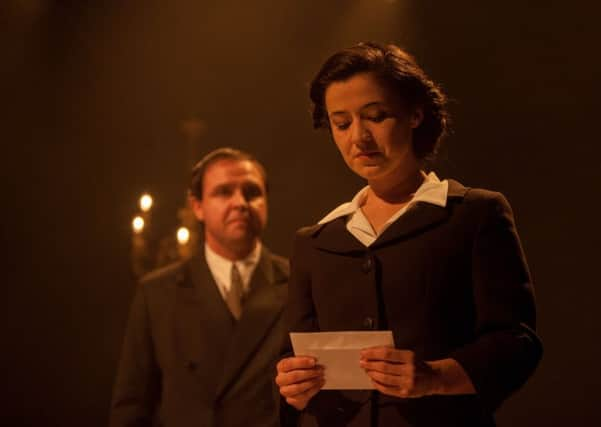Theatre reviews: The Biscuit, Oran Mor, Glasgow | Nye & Jenny, The Studio, Edinburgh


The Biscuit, Oran Mor, Glasgow **
Nye & Jenny, The Studio, Edinburgh ***
And now here comes Bafta-winning radio and film writer Donald McLeary, with a similar scenario in which a Tory premier – the one after this one, we’re led to imagine – finds himself locked up with his wife, who is also his Health Secretary, in a Downing Street cupboard already occupied by a cheery Scottish cleaner called Colin.
It’s a tense situation, in other words, full of dramatic promise; but despite the best efforts of three hard-working and talented actors – Stephen Clyde, Shonagh Price, and Paul Clark as Colin – McLeary’s play somehow fails to take flight. Perhaps part of the problem lies with Kate Brailsford’s production, which seems awkwardly perched between naturalistic situation comedy and outright farce, with the actors uncertain whether to go for credibility or caricature.
Advertisement
Hide AdMostly, though, it’s a certain deadness in the writing that seems to be blame; as if, having set up the scenario, McLeary finds it slightly less interesting than he hoped. The subject of Britain’s wealth gap, and the gulf between low-wage workers and the millionaire boss class, is hardly original, after all; and even the play’s central image reflect a series of well-worn political jokes about a boss class that routinely eats almost all the biscuits, and then incites the workers and the middle class to fight over what’s left.
The result is a short play than nonetheless sags heavily in the middle; and although a couple of sharp, improbable
plot-twists help to liven things up towards the end, they do nothing for the credibility of a play that’s unlikely to add much to the wisdom or gaiety of the nation, in its hour of need.
There’s a richer vein of political drama in the Welsh company Theatre Na Nog’s touring show Nye & Jenny, about the 20th century lives of Labour politicians Nye Bevan and Jennie Lee, he from the Welsh valleys, she from the Fife coalfield, which appeared briefly at the Festival Theatre Studio over the weekend.
Set in a single room in the couple’s London flat, and running for only 80 minutes, Nye & Jennie takes the form of a memory play in which Louise Collins – struggling slightly with her Fife accent, as Jennie – looks back over her life with Nye, at the tremendous strains between their pioneering brand of socialism and the pragmatic centrism of the party to which they both gave their lives, and at Nye’s crowning moment of achievement during the Labour Government of 1945-51, when, as Health Minister, he won an indelible place in the hearts of the British people as the founder and father of the NHS.
In truth, it’s rather a large story to encompass in such a short show. It tends to take a slightly romantic view of a complex relationship that was always as much about political comradeship as romantic love; and in finishing the narrative with Nye’s death in 1960, it underplays Jennie’s soaring achievements as Britain’s first arts minister, between 1964 and 1970.
Advertisement
Hide AdYet with Gareth John Bale acting up an irresistible storm as the mercurial Nye, and the parallels between our own time and the cruel 1930s that shaped the couple’s politics singing out from Meredydd Barker’s powerful, poetic script, it makes for a moving and fascinating show, nonetheless; and leaves us hungry for an even greater understanding of that remarkable decade when Britain first roused itself to fight fascism, and then dedicated itself to creating a peace in which the people’s welfare would, for once, be its defining – and unifying – goal. - Joyce McMilan